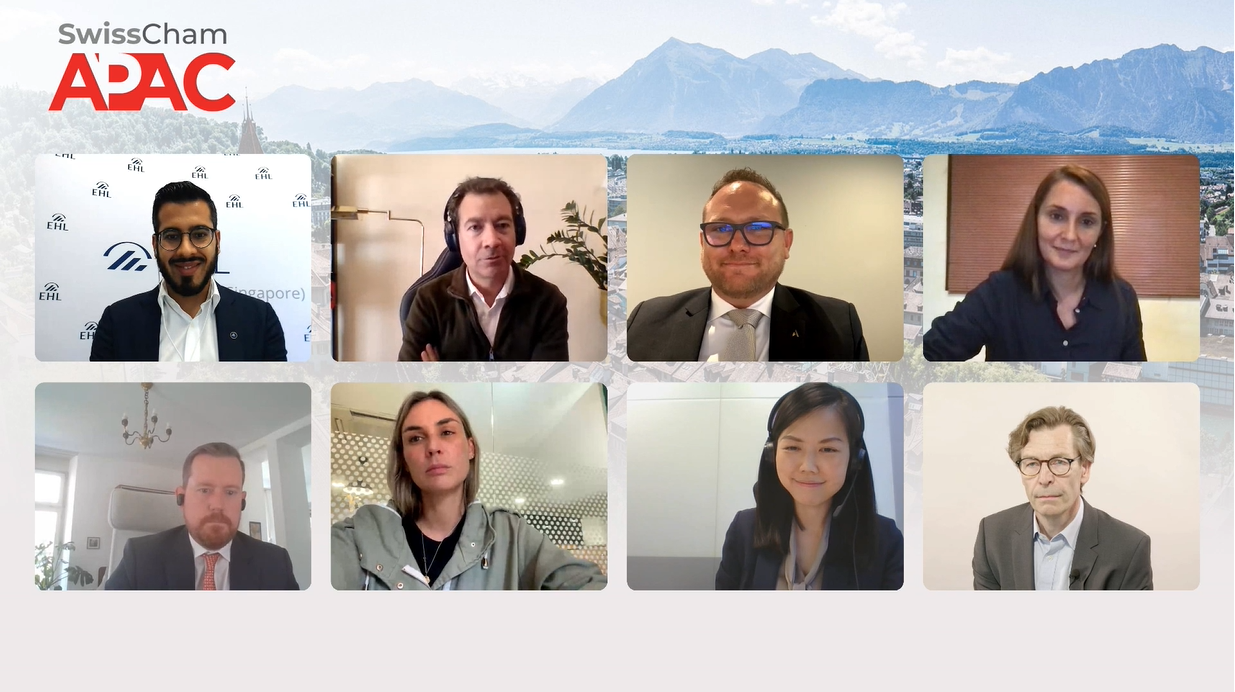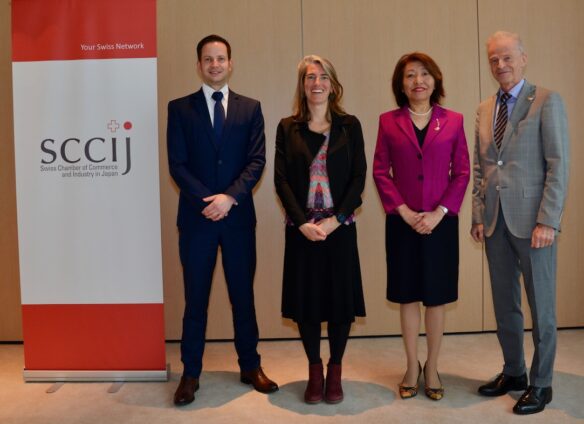Tokyo (SCCIJ) – The Swiss Chambers of Commerce (SwissChams) in Asian-Pacific Countries (APAC) have continued their new collaboration with the second of four planned webinars focused on sustainability. The collaboration includes 11 regional SwissChams and the Swiss-Asian Chamber of Commerce in Switzerland (SACC), with roughly 2,000 corporate members. We summarize the discussion of the panel at the webinar.

The second webinar of Swiss chambers in the APAC region in 2022 focused on sustainability in the hospitality industry.
Introduction
With the end of most restrictions forced by the pandemic, tourism is making a comeback. Consequently, the second webinar about sustainability looked at the hospitality industry in the APAC region. After an introductory talk about “Swisstainable – Sustainability Swiss made” by Sara Roloff, Director APAC of Switzerland Tourism, six experts joined a panel moderated by Carlos Martin-Rios, Professor of Management at Ecole hôtelière de Lausanne (EHL) and Luciano Lopez, Dean of EHL Campus (Singapore). The panelists reacted to questions that were either presented by the moderators or chosen by the webinar participants.
Q: International travel has been on hold for more than two years, will its restart negatively affect sustainability efforts, or will the tourism industry look ahead instead of fast immediate profits?
Tara Hammond (Group Sustainability, Asian Trails): “In our case, the pandemic has given us pause. We have been assessing animal exposure, transportation, and supplies. All that gives us hope that after the reopening we have the products and the supply chain and that we can have sustainable tourism for the mass market.”
Ann Yu (Country Manager Philippines, Kuoni Tumlare): “There is a new generation of travelers who are environmentally conscious and willing to make a change. We can launch sustainable packages from Europe to Asia. We bring all these travel agencies who want to join our experience and let them experience on sight in Switzerland what sustainable travel is like, for example taking trains and not carrying your luggage.”
Jurg Tschanz (Co-Founder, planitswiss Asia): “In our field of business travel, we are realizing that people are more on quality and less on quantity, travel less but more sustainable and use other more innovative approaches like video conferences. I am convinced that sustainability will change our business models. 50% of our services are now innovative and digital.”
Katherine Desbaillets (Chief Brand Officer / Co-Owner, SaladStop Group): “It is taking one step at a time. People still want the ease of a quick lunch. When we put a charge on our bags, we had a pushback. But we push the boundaries and illustrate our approach with our first net-zero store. We are trying as much as possible to integrate this into the operation.”
John Timson (VP Sustainability & Safety, South East Asia, Japan & Korea, Accor): “There is a growth of social enterprises, two of which are represented on the panel today. These new businesses with social impact and return will force established companies to change their business models. But this strategic shift will only happen when there is enough drive from external market forces.”
Q: How are you measuring the sustainability effort?
Katherine Desbaillets (Chief Brand Officer / Co-Owner, SaladStop Group): “We approve the targets for carbon emission reductions every year, and give incentives to customers.”
Jurg Tschanz (Co-Founder, planitswiss Asia): “We are avoiding food waste and plastic use at our events. We measure sustainability by the amount of waste and plastic we can avoid.”
Q: What is your definition of a good or best practice?
Ann Yu (Country Manager Philippines, Kuoni Tumlare): “We have signed a Memorandum of Understanding with Switzerland Tourism and create our sustainable travel packages with an end-to-end-process from the government to the customers.”
Tara Hammond (Group Sustainability, Asian Trails): “We have developed the ‘sustainable trails’ product covering different aspects, i.e. eat more locally. We can shape consumer demand because we are between buyers and suppliers.”
Q: How do you think the practices put in place will affect your profit and through which mechanism?
Simon Lloyd (Dean, International Hospitality Industry, Dusit Thani College): Short-term looking, there is a pricing premium for sustainability. The long-term outlook is that the return is coming from volumes. Thirdly, it is coming from cost reduction. There is an increasing demand for sustainable products, especially among customers from Europe.
Q: If a new company opens in your sector, what advice will you give to the new company to start on the right track in terms of sustainability?
Katherine Desbaillets (Chief Brand Officer / Co-Owner, SaladStop Group): “Start small and incentivize customers. However, our industry is a little bit tough. We give our customers the option to offset the carbon emissions of their deals. But even with a low fee, only 3% of them opt in. Hence, we push more on the educational front.
John Timson (VP Sustainability & Safety, South East Asia, Japan & Korea, Accor): “We are looking at the customer-focused sustainability and its impact on their decisions. Short-term, this may inflict pain on the business, but long-term it will certainly deliver for owners and the industry.”
Q: How do you communicate without creating the impression of greenwashing?
Jurg Tschanz (Co-Founder, planitswiss Asia): “Cost is important. The bottom line should not go up if using circular economies. This is the case today, but the company needs to invest, or we will not be there tomorrow. If you increase happiness because the customer does not have to travel all the time, then a customer may see the benefits.”
Ann Yu (Country Manager Philippines, Kuoni Tumlare): “Communication is one of our challenges. We try to engage with our suppliers and make them share their feedback. We do not want to leave anybody behind. But it is very inspiring because everybody is willing to make the change.”
John Timson (VP Sustainability & Safety, South East Asia, Japan & Korea, Accor): “The way we discuss sustainability needs to change. We need clear messages to avoid greenwashing. Many of our employees do not want to hear anymore why we are doing it but to understand what they can do to be more sustainable.”
Q: What management actions do your organizations put in place? What are specific actions taken into consideration?
Tara Hammond (Group Sustainability, Asian Trails): “One of our biggest challenges is to get everyone on board. Training has to be a priority. W have a training system for tourism bodies, myself is also does training, we have guest speakers. One of the opportunities of the pandemic’s downtime was to do more in this area.”
Simon Lloyd (Dean, International Hospitality Industry, Dusit Thani College): “Looking from the education perspective: A few years ago sustainability was a single subject, now we want to integrate sustainability into each area. That shift is now taking place at a higher education level, and the students are more aware how to do it. This positive shift will help to drive the agenda forwards.”
Note: Upon registration to the SwissCham APAC platform, the recordings of Episode 1 and 2 are available here. The inaugural webinar in March 2022 focused on what Swiss companies have already achieved and what can be emulated and scaled by other players in APAC. Episode 3 scheduled for September will focus on sustainability and plastics.
Text: Martin Fritz for SCCIJ





























